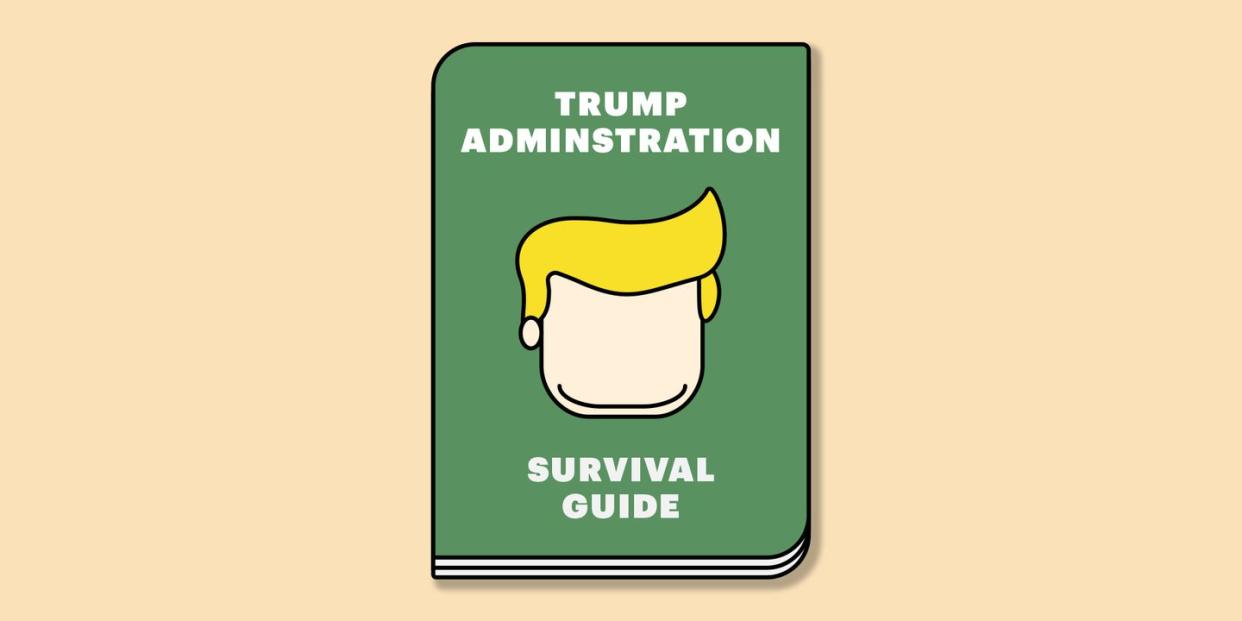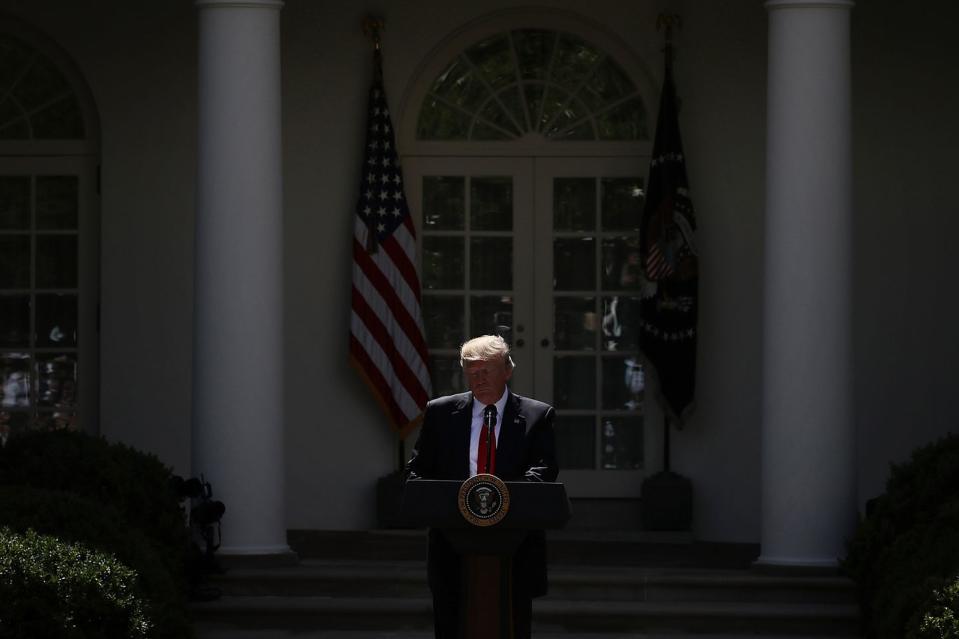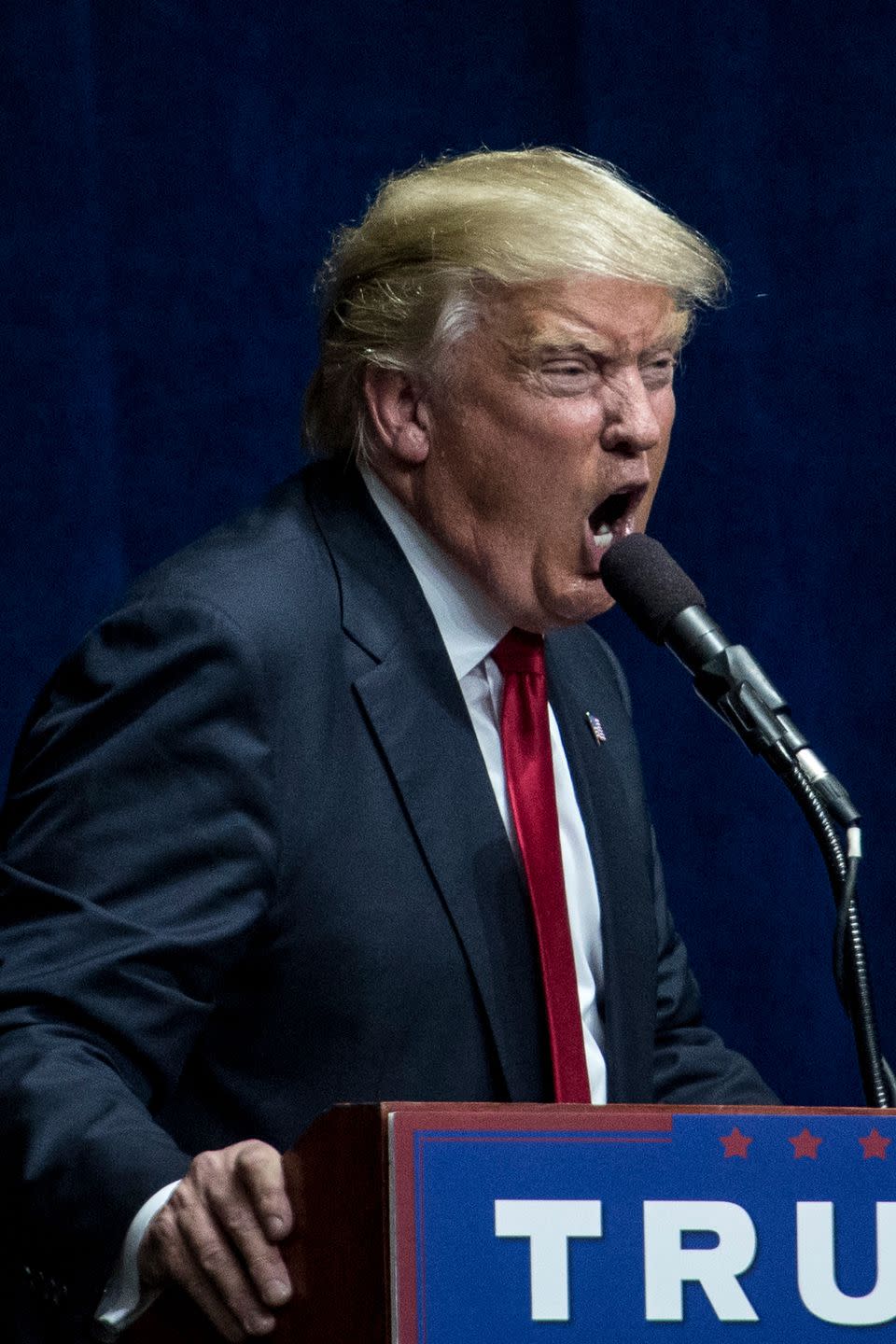A Renowned Survival Expert Has Some Advice for Making It Out of the Trump Administration Alive

It's a sign of the times that when looking for a light summer read, I turned to Laurence Gonzales's 2003 book, Deep Survival: Who Lives, Who Dies, and Why, about thrill-seekers and bad-luck sufferers trying to pull through disasters. My hope was that stories of plane crashes, boating accidents, and mountaineering mishaps would be a welcome escape from reality.
While reading about a hiker lost in the wilderness and frantically trying to find his way back to civilization, it hit me that our country is in a similar position. Instead of being an escape, the book turned out to be a very useful primer on how we might survive Donald Trump.

I didn't want to read too much into the text, so instead, I tracked down the bestselling author who's written several books on the topic. Gonzales has spent his life pursuing adrenaline-inducing activities, so I pictured him climbing Mt. Hood, riding his motorcycle through Mexico, or flying through a canyon in a homebuilt copy of a two-seat Italian fighter plane. As it turned out, Gonzales was sitting at home in Evanston, Illinois, getting ready to head to the Santa Fe Institute where he's an SFI Miller Scholar.
Since turning 70 this year, Gonzales has "retired from adventuring," but that doesn't mean life has lost its edge. He told me that watching the news, he's never been so scared in his life.
"9/11 was nothing compared to what's coming," he said. "I don't want to minimize those deaths, or the impact that had on those families, but as a nation, we're staring down the barrel of this very dangerous gun in the form of this lunatic in the White House."
To Iranian President Rouhani: NEVER, EVER THREATEN THE UNITED STATES AGAIN OR YOU WILL SUFFER CONSEQUENCES THE LIKES OF WHICH FEW THROUGHOUT HISTORY HAVE EVER SUFFERED BEFORE. WE ARE NO LONGER A COUNTRY THAT WILL STAND FOR YOUR DEMENTED WORDS OF VIOLENCE & DEATH. BE CAUTIOUS!
- Donald J. Trump (@realDonaldTrump) July 23, 2018
Less than a month ago, Trump tweeted at Iranian President Hassan Rouhani and threatened Iran with "consequences the likes of which few throughout history have ever suffered before." Gonzales spoke calmly as he discussed why the threat of nuclear annihilation is at the top of his list of risks that keep him up at night.
"The way the system of nuclear weapons works, you can't just drop one bomb. They'll all go off at the same time," Gonzales explained. "This isn't Dr. Strangelove. This is real. And these weapons are in the hands of two insane people: one being Kim Jong Un, and the other being Donald Trump. And at least Donald Trump would very much like to use them."
This week, Trump signed the John S. McCain National Defense Authorization Act which includes money to build "low-yield," flexible nuclear warheads that could be launched from submarines.
Gonzales also worries about the Russians hacking into the electrical grid-not that they might, but that they did. He worries about the Patriot Act, which, "destroyed the Bill of Rights," and plunged the country into "an Orwellian police state" which could lead to martial law.
To Survive This, We Can't Ignore It
Recounting lessons from his book, Gonzales believes the survival of democracy depends on our ability to perceive and believe reality. "One of the reasons we get into hazardous situations is because we see stuff and just ignore it," he says. "Our brains are trained to make mental models. We remember that a dog is a dog so that every time we see a dog, we don't have to ask, 'What is that creature?'"
Modeling makes our brains more efficient by giving us the ability to make associations without taking each detail into account. The downside is we lose our ability to notice things. People view Donald Trump as “the President” because he occupies the same space as the previous residents of the White House. But Trump’s not the same. It’s like seeing a mountain lion slip through a doggie door as a child rushes over, declaring, “Puppy!”
“We need to see him for how he really is,” says Gonzales. “A psychopathic, lying, misogynistic, lunatic-pick your adjective.”
The inability to perceive and believe reality when under stress is called “bending the map.” A hiker in Deep Survival heads for the top of a mountain. Hours later, it’s getting dark. A storm is coming in. He thinks he’s close to his destination and is surprised when the lake on the map that should be just on the left, isn’t there at all. Instead of concluding that he must have strayed from the path, the hiker instead concludes, “The lake must have dried up.” He rejects the map and keeps going, further and further away from where he needs to go.
Gonzales thinks the reaction to Trump’s performance in Helsinki was a version of “bending the map.” The perception was the leaders of the United States and Russia held a summit. The reality was Trump had a long, private meeting with Vladimir Putin. Then, in front of the world, Trump dismissed the United States’ intelligence community. “We have to recognize that whatever comes out of Trump’s mouth is not designed to help the United States. It’s designed to further his own agenda and Russia’s agenda,” Gonzales explains. “That’s what he’s there for. And he was put there by an enemy of the United States.”
Perceiving and believing works best when we react to the truth without emotion. Emotion allows us to be shocked and disgusted and outraged. “Can you believe Trump did that?!” we ask. We keep thinking of what should be there, like a dried-up lake, instead of seeing what is there. If you’re pointing out that Trump said he “would hire the best people” and didn’t, you are stumbling in circles.

“Accepting reality takes a hard heart,” Gonzales advises. He cites the story of mountain climber Joe Simpson whose partner was forced to “cut the rope,” believing he was sending Simpson to certain death.
“There are a lot of good, smart Republicans out there and they need to cut the rope on this guy,” says Gonzales. “That means being willing to say the truth, and being willing to recognize that Trump has committed crimes, and being willing to impeach him, even though he ran on a Republican ticket.”
Gonzales offers the same advice to the GOP that he offers a hiker who is “bending the map.” “Get back to a known position,” he says. “Too often we keep going forward, when the safest choice is to retrace our steps. You need to walk back the trail that brought you here.”

For Democrats, Gonzales has five pieces of advice on how to survive:
1. Support each other and don’t give in to hysteria (even when it’s warranted).
In Deep Survival, a boat capsizes and while the group is waiting to be rescued, some of the passengers start to freak out. Two level-headed people decide to band together and make a pact to not drink sea water. One slept while the other watched. They made each other laugh. “They decided to cut themselves off from the hysterical people, and just concentrate on each other,” says Gonzales. (They lived.)
2. Show compassion.
Doing things for others is a crucial element in survival. “Doctors and nurses do better in survival situations, because they’re helping others,” says Gonzales. “This goes hand-in-hand with the psychological concept of the locus of control. Some people see themselves as victims and others take the view that they have agency in this world and can make things better. They’re rescuers, not victims.”
3. Find a leader.
Survivors organize, set up routines, and institute discipline. Gonzales believes the Democrats need a leader, “like a John F. Kennedy or Barack Obama. Somebody who everybody can get passionate about.”
4. Lay off the Trump jokes a little.
Gonzales praises humor as a general survival tactic, but thinks it would be better if late-night shows pulled backed on the Trump jokes. “Making fun of Donald Trump lessens the impact of knowing how evil and dangerous he is,” says Gonzales. “So, all this Saturday Night Live stuff is not helpful. It just lessens our fear. And we should be very afraid right now.”
5. Don’t give up.
The attitude “As long as I can take a step, I’m going to take a step” doesn’t always lead to success, but it’s certainly better than nothing. Gonzales recommends that people take to the streets. “During my youth, when the Vietnam war was going on, people made enough noise that Johnson didn’t run for reelection; and the war had to eventually end. People have the power to go out and make their wishes known and have an influence.”
We Can't Rely on Chance
Gonzales’s book makes it clear that when people wait to be rescued, as opposed to taking positive action on their own behalf, they make themselves more vulnerable. Chance may spare them. But chance isn't always the best wilderness guide. Protesting, organizing, finding leaders and voting is democracy’s best hope for survival.
Gonzales offered one final, poignant metaphor: “A tourist boat recently sank in Branson and killed seventeen people. You know, there’s an awful lot known about how to make boats. And that boat should not have been in the water. There’s also an awful lot known about the weather in July in Missouri. Anybody can look at the radar on a cell phones, and say, ‘Oh, this doesn’t look so good. Let’s wait.’ Instead, this idiot captain drove into a storm, and killed half the people on his boat. I would liken that to the political-economic-geopolitical situation we’re in right now.”
('You Might Also Like',)

